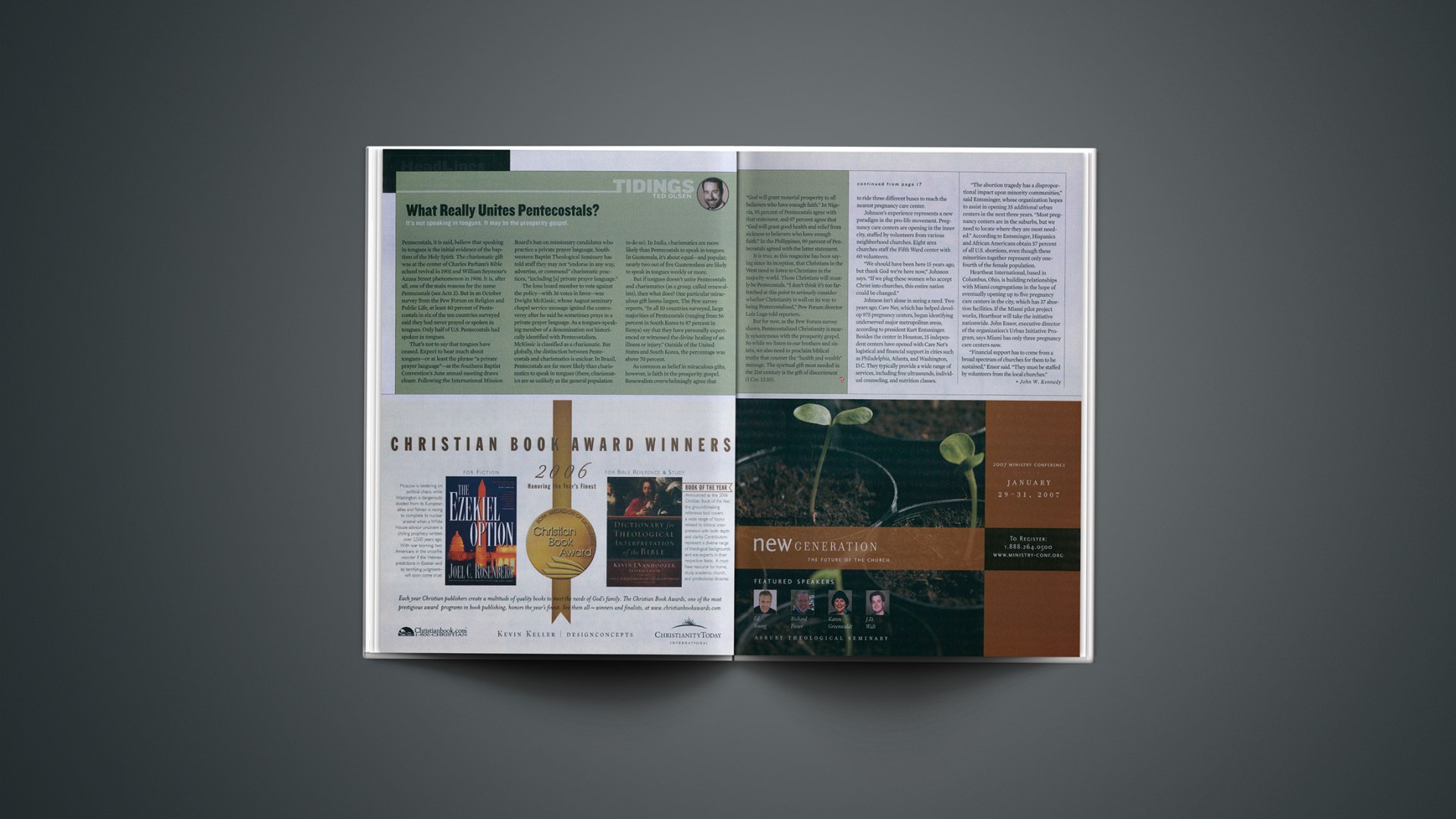Pentecostals, it is said, believe that speaking in tongues is the initial evidence of the baptism of the Holy Spirit. The charismatic gift was at the center of Charles Parham’s Bible school revival in 1901 and William Seymour’s Azusa Street phenomenon in 1906. It is, after all, one of the main reasons for the name Pentecostals (see Acts 2). But in an October survey from the Pew Forum on Religion and Public Life, at least 40 percent of Pentecostals in six of the ten countries surveyed said they had never prayed or spoken in tongues. Only half of U. S. Pentecostals had spoken in tongues.
That’s not to say that tongues have ceased. Expect to hear much about it—or at least the phrase “private prayer language“— as the Southern Baptist Convention’s June annual meeting draws closer. Following the International Mission Board’s ban on missionary candidates who practice a private prayer language, Southwestern Baptist Theological Seminary has told staff they may not “endorse in any way, advertise, or commend” charismatic practices, “including [a] private prayer language.”
The lone board member to vote against the policy—with 36 votes in favor—was Dwight McKissic, whose August seminary chapel service message in which he said he sometimes prays in a private prayer language ignited the controversy. As a tongues-speaking member of a denomination not historically identified with Pentecostalism, McKissic is classified as a charismatic. But globally, the distinction between Pentecostals and charismatics is unclear. In Brazil, Pentecostals are far more likely than charismatics to speak in tongues (there, charismatics are as unlikely as the general population to do so). In India, charismatics are more likely than Pentecostals to speak in tongues. In Guatemala, it’s about equal—and popular; nearly two out of five Guatemalans are likely to speak in tongues weekly or more.
But if tongues doesn’t unite Pentecostals and charismatics (as a group, called renewalists), what does? Disputes even between these groups can be intense: the Brazil-based Universal Church of the Kingdom of God—one of the only Pentecostal churches highlighted in the Pew Forum poll—was kicked out of Zambia, a largely Pentecostal country, as a “satanic cult.” (The ban was liftedpending an appeal, but church leaders have been deported.)
Still, Renewalists are generally united by a belief in miraculous gifts, but even this isn’t unanimous; 14 percent of American Renewalists disagree with the statement, “Miracles still occur today as in ancient times.” One particular miraculous gift looms largest. The Pew survey reports, “In all 10 countries surveyed, large majorities of Pentecostals (ranging from 56 percent in South Korea to 87 percent in Kenya) say that they have personally experienced or witnessed the divine healing of an illness or injury.” Outside the U.S. and South Korea, the percentage was above 70 percent.
As common as belief in miraculous gifts, however, is faith in the prosperity gospel. Renewalists overwhelmingly agree that “God will grant material prosperity to all believers who have enough faith.” In Nigeria, 95 percent of Pentecostals agree with that statement, and 97 percent agree that “God will grant good health and relief from sickness to believers who have enough faith.” In the Philippines, 99 percent of Pentecostals agreed with the latter statement.
It is true, as this magazine has been saying since its inception, that Christians in the West need to listen to Christians in the majority world. Those Christians will mostly be Pentecostals. “I don’t think it’s too farfetched at this point to seriously consider whether Christianity is well on its way to being Pentecostalized,” Pew Forum director Luis Lugo told reporters.
But for now, as the Pew Forum survey shows, Pentecostalized Christianity is nearly synonymous with the prosperity gospel. So while we listen to our brothers and sisters, we also need to proclaim biblical truths that counter the “health and wealth” message. The spiritual gift most needed in the 21st century is the gift of discernment (1 Cor. 12:10).
Copyright © 2006 Christianity Today. Click for reprint information.
Related Elsewhere:
A version of this column originally ran in the December 2006 print edition of Christianity Today. The column “Tidings” was formerly called “Weblog in Print.” Earlier columns by Ted Olsen include:
Does Islam Need a Luther or a Pope? | American pundits debate whether centralized religious authority restrains violence. (Oct. 20, 2006)
Asylum vs. Assistance | Offering sanctuary isn’t about political protest. (Sept. 26, 2006)
We’re Not Spectators | Mideast Christians writing for our website expressed their anguish—and anger. (Aug. 28, 2006)
Latter-day Complaints | Mormons and evangelicals fret over movies, politics, and each other. (Jul. 6, 2006)
Peace, Peace | From the front page to the obits, one day’s news about Christian peacemaking. (Apr. 18, 2006)
The Art of Abortion Politics | A unanimous Supreme Court decision opens the door to real change. (Feb. 20, 2006)
Time to Get Judicially Serious | Evangelicals and the possible Supreme Court Catholic majority. (Dec. 28, 2005)
The Katrina Quandary | America questions the role of Christian charity. (Oct. 20, 2005)
Abolishing Abstinence | Telling underage kids not to have sex is surprisingly controversial (Aug. 24, 2005)
Dirty Qur’ans, Dusty Bibles | If Leviticus or Jude suddenly disappeared from Scripture, would we notice? (June 20, 2005)
Who’s Driving This Thing? | Everyone is asking who leads the evangelical movement. (Feb. 21, 2005)
Bad Believers, Non-Believers | Do religious labels really mean anything? (Oct. 19, 2004)
Pro-Abortion Madness | The abortion lobby has abandoned its rationales amid pro-life gains. (Aug. 17, 2004)
Grave Images | The photos from Abu Ghraib have reopened debate on the power of pictures. (June 21, 2004)
Misfires in the Tolerance Wars | Separating church and state now means separating belief and action (Feb. 24, 2004)










